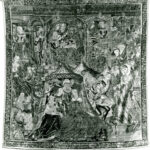Slavomir Rawicz (1915-2004) was a Polish army officer, explorer, and author, renowned for his book “The Long Walk: The True Story of a Trek to Freedom.” Born on March 1, 1915, in Pinsk, part of the Russian Empire at the time, Rawicz lived a life filled with extraordinary adventures, resilience, and determination.
Rawicz began his military career in the Polish army, fighting against the invading German forces during the early stages of World War II. However, in 1939, he was captured by the Soviets, accused of espionage, and subsequently sentenced to 25 years of hard labor in a Siberian Gulag. During his time in the Gulag, Rawicz endured severe hardships, including harsh living conditions, forced labor, and physical abuse.
In 1941, when the Soviet Union was invaded by Nazi Germany, Rawicz and a group of six fellow prisoners managed to escape from the Gulag. They embarked on an incredible journey, trekking thousands of miles on foot through the Siberian wilderness, the Gobi Desert, Tibet, and the Himalayas, ultimately reaching British India. Rawicz’s awe-inspiring journey formed the basis of his book, “The Long Walk,” initially published in 1956.
“The Long Walk” recounts the grueling challenges faced by Rawicz and his companions during their escape and quest for freedom. The book gained significant attention and became an international bestseller, captivating readers worldwide. However, over time, Rawicz’s account came under scrutiny and sparked controversy.
Critics questioned the veracity of “The Long Walk,” suggesting that it was a work of fiction rather than a true story. They pointed out inconsistencies in Rawicz’s narrative, geographical inaccuracies, and the absence of corroborating evidence. Additionally, similarities between Rawicz’s journey and another escapee’s account, Witold Glinski, raised doubts about the authenticity of Rawicz’s story.
Despite the controversy surrounding his book, Rawicz steadfastly maintained the truthfulness of his account and defended his experiences. He argued that any discrepancies were a result of imperfect memory, the passage of time, and the need to protect the identities of individuals mentioned in the book.
After his escape and subsequent arrival in British India, Rawicz joined the Polish Army in Exile and fought alongside British forces during World War II. He participated in various campaigns, including the Battle of Monte Cassino in Italy. Following the war, Rawicz settled in England, where he pursued a career as a land surveyor.
In the 1990s, doubts surrounding “The Long Walk” grew when British journalist David Hempleman-Adams retraced Rawicz’s supposed route and concluded that it would have been physically impossible for the escapees to traverse the Himalayas as described in the book. This further fueled skepticism regarding the accuracy of Rawicz’s account.
Despite the skepticism, Rawicz’s story continued to captivate the public’s imagination, and “The Long Walk” remained a popular book, inspiring many with its themes of endurance, survival, and the unwavering human spirit. In 2010, the book was adapted into a feature film titled “The Way Back,” directed by Peter Weir.
Slavomir Rawicz passed away on April 5, 2004, in Nottingham, England, at the age of 89. His legacy remains a subject of controversy, with ongoing debates about the authenticity of his story and the accuracy of “The Long Walk.” While some regard Rawicz as a courageous adventurer and survivor, others perceive his account as a work of fiction rather than an accurate memoir.
Irrespective of the precise details of his journey, Rawicz’s story continues to symbolize the resilience of the human spirit in the face of adversity. It serves as a testament to the enduring power of hope and the unwavering determination to overcome seemingly insurmountable obstacles.
Sources
Gulag: Soviet Forced Labor Camps and the Struggle for Freedom (gulaghistory.org)
The Long Walk: The True Story Of A Trek To Freedom – 9781493022618 (rowman.com)







